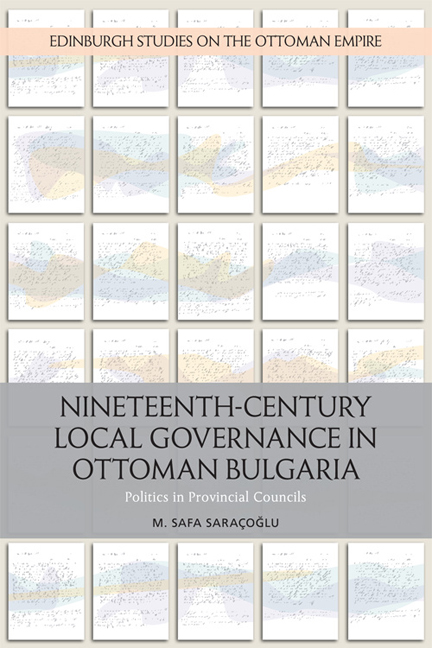Book contents
- Frontmatter
- Contents
- List of Maps, Figures and Tables
- Abbreviations
- Preface
- Map
- 1 Introduction
- 2 Contextualising the Nineteenth Century
- 3 Sitting Together: Local Councils and the Politics of Election in the County of Vidin
- 4 Once Inside the Chamber . . . Participation in the Politics of Local Administration
- 5 Writing Politics: Ottoman Governmentality and the Language of Reports
- 6 ‘Cattle Thieves’: Refugee Settlement, Ottoman Governmentality and Biopolitics
- 7 Conclusion
- Select Bibliography
- Index
6 - ‘Cattle Thieves’: Refugee Settlement, Ottoman Governmentality and Biopolitics
Published online by Cambridge University Press: 24 April 2021
- Frontmatter
- Contents
- List of Maps, Figures and Tables
- Abbreviations
- Preface
- Map
- 1 Introduction
- 2 Contextualising the Nineteenth Century
- 3 Sitting Together: Local Councils and the Politics of Election in the County of Vidin
- 4 Once Inside the Chamber . . . Participation in the Politics of Local Administration
- 5 Writing Politics: Ottoman Governmentality and the Language of Reports
- 6 ‘Cattle Thieves’: Refugee Settlement, Ottoman Governmentality and Biopolitics
- 7 Conclusion
- Select Bibliography
- Index
Summary
Only when we know what … liberalism was, will we be able to grasp what biopolitics is. (Foucault 2008: 22)
This chapter focuses on governmental practices regarding different groups of refugees, particularly Circassians, who came to Vidin in the second half of the nineteenth century. It explores their problematisation in official correspondence as an example of how different agents handle specific matters related to life and population by governmental technologies. The efforts of the Ottoman state in settling the refugees has been examined in several different works (Chatty 2010; Rosser-Owen 2007; Shami 2000; Cuthell 2005; Pinson 1970). It is commonly accepted that this was a major challenge to the state and was a very painful process for the refugees. ‘Problematisation, in this context, refers to the processes through which certain acts, practices, and thoughts emerge as “problems” for politics’ (Foucault 1984). This is an attempt to conceptualise the dispute I discussed briefly in the last chapter involving the Tatar and Circassian refugee groups, Matyaş Ağa and the district head in ‘Adliye (Case No. 544 in NBKM, VD 107/16). The two groups were in a dispute about the district head's use of his powers to force the Tatars to lend their horses to carry the wheat tithe of the Circassians. I discuss this case as an example of biopolitics.
Foucault (2008: 317) defines biopolitics as ‘the attempt, starting from the eighteenth century, to rationalize the problems posed to governmental practice by phenomena characteristic of a set of living beings forming a population: health, hygiene, birth-rate, life expectancy, race …’. Although Foucault's use of ‘biopolitics’ may not always have been ‘consistent’, as argued most recently by Lemke, his lectures devoted to the topic provide a consistent and connected group of meanings, for this particular technology of government. Biopolitics, through the way that it operates, reaffirms the validity of a liberalist system where governing is a necessity defined and limited by the effort to avoid obstacles to market operations which are inseparable from the well-being of civil society.
Following a brief elaboration on the difficulties in estimating the number of refugees coming in the region and the complexity of the situation that Ottomans faced, I discuss how refugees became a problematic in Ottoman governmentality.
- Type
- Chapter
- Information
- Nineteenth Century Local Governance in Ottoman BulgariaPolitics in Provincial Councils, pp. 146 - 164Publisher: Edinburgh University PressPrint publication year: 2018



